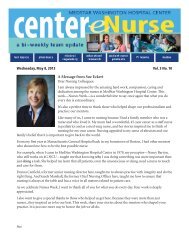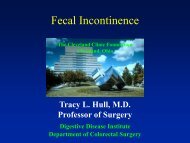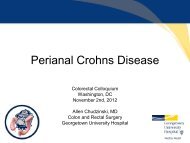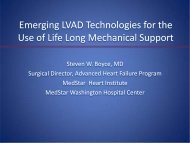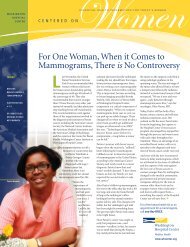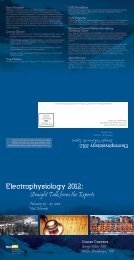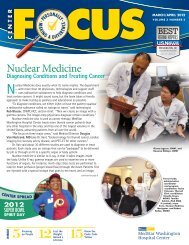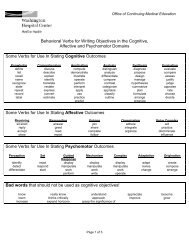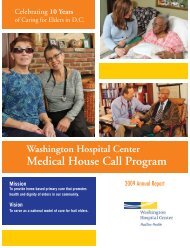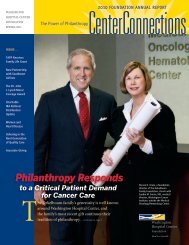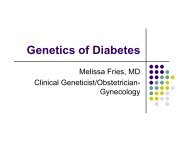4NE Hosts 102-Year-Old Heart Patient - Washington Hospital Center
4NE Hosts 102-Year-Old Heart Patient - Washington Hospital Center
4NE Hosts 102-Year-Old Heart Patient - Washington Hospital Center
You also want an ePaper? Increase the reach of your titles
YUMPU automatically turns print PDFs into web optimized ePapers that Google loves.
WASHINGTON HOSPITAL CENTER<br />
e<br />
NEWS FROM THE<br />
DEPARTMENT OF NURSING<br />
Volume 2, Issue 5 February 4, 2011<br />
“Incredibly Inspiring” Says Staff<br />
<strong>4NE</strong> <strong>Hosts</strong> <strong>102</strong>-<strong>Year</strong>-<strong>Old</strong> <strong>Heart</strong> <strong>Patient</strong><br />
Eulis T. Saunders, <strong>102</strong>, poses with<br />
staff on <strong>4NE</strong>.<br />
In this Issue<br />
2 A Message from Tonya <strong>Washington</strong><br />
3 Nursing Mini-Town Hall Meetings<br />
4 Advance Directive Training<br />
5 Viewpoints<br />
National <strong>Heart</strong> Month didn’t exist when Eulis T. Saunders<br />
was born. The <strong>102</strong>-year-old congestive heart failure patient<br />
didn’t seem to care what the fuss was about when the <strong>4NE</strong><br />
staff poured into his room to pose for a photograph to celebrate the<br />
beginning of the month-long celebration; he just wanted to chat.<br />
Born in Raleigh, N.C., in 1909, Mr. Saunders said his family grew<br />
everything they ate, and he’s enjoyed good health most of his life.<br />
He’s got some trouble with his heart, but still lives alone and is<br />
sharp as a tack, say his caregivers on <strong>4NE</strong>. DeAnne Zwicker, DrNP,<br />
Gerontology, said staying mentally and physically active go a long<br />
way toward keeping people like Mr. Saunders healthy. She said,<br />
“It’s important for acute care nurses to keep older adults physically<br />
and cognitively functioning while in the hospital by helping them<br />
maintain their baseline physical functioning and engaging them in<br />
conversation regardless of their cognitive status.”<br />
One of his nurses, Catherine Herman, RN, said, “He’s incredibly<br />
inspiring. While his daughter-in-law cooks for him at home, he’s<br />
still independent and is the most positive person I’ve ever met. He<br />
compliments the hospital food and says it looks beautiful when his<br />
tray arrives. Mentally and physically, he’s amazing.”<br />
6 Fashion Show Photos<br />
7 4H Doubles Their Success<br />
8 Hypoglycemic and Glucose Testing<br />
Continued on page 8
2<br />
A Message from Tonya <strong>Washington</strong><br />
Dear Nursing Colleagues,<br />
Recently the Bioethics department, directed by Nneka Mokwunye, PhD, has been<br />
reinforcing <strong>Washington</strong> <strong>Hospital</strong> <strong>Center</strong>’s <strong>Patient</strong> Rights and Responsibilities in<br />
preparation for The Joint Commission’s impending visit. While it’s important for<br />
each of us to know and internalize these for a number of reasons, highlighting<br />
them today gives me an opportunity to reinforce how integral nurses are to<br />
protecting these rights on behalf of our patients.<br />
✦ All patients have the right to confidentiality, privacy and access to their protected<br />
health information. Nurses play a key role in protecting patient privacy. Be sure<br />
you give patient information only to authorized recipients, according to the<br />
D.C. Hierarchy of Decision Makers. If you don’t have one of the at-a-glance<br />
Hierarchy badge cards, ask Dr. Mokwunye or her team for one.<br />
✦ All patients have the right to be safe and secure. As a caregiver, it’s fundamental that you ensure<br />
patients don’t fall from their beds and that restraints are appropriate. Nurses take safety one<br />
step further: when family members or visitors aren’t acting in the patient’s best interest, call<br />
Protective Services right away.<br />
✦ All patients have the right to make decisions regarding acceptance or refusal of medical care. If<br />
they are unable to make their own decisions, they have the right for a family member or surrogate<br />
to make those decisions. Nurses frequently are asked to witness informed consent documents.<br />
While a physician discusses the matter with the patient, a nurse verifies that the patient has<br />
no questions and witnesses the patient’s or guardian’s signature.<br />
✦ All patients have the right to have an advance directive and to have their directive followed to the<br />
extent appropriate. <strong>Patient</strong>s have the right to assistance facilitating their advance directives.<br />
During discussions with patients about advance directives – and such a discussion should<br />
occur with every patient – a nurse confirms the patient or family member has no more<br />
questions and follows up to ensure the document is provided to the hospital. If the patient or<br />
family needs more information, the nurse should request a social worker consult.<br />
✦ <strong>Patient</strong>s have the right to file complaints and have those complaints addressed in a timely<br />
manner. If a patient or family member has a complaint of any kind, the nurse gives the<br />
patient information on how to contact the <strong>Hospital</strong> <strong>Center</strong>’s <strong>Patient</strong> Advocacy office.<br />
✦ <strong>Patient</strong>s have the right to have their spiritual needs addressed. Our nurses do a terrific job of<br />
calling Spiritual Care providers on behalf of our patients. Because addressing the patient’s<br />
spiritual needs are so integral to successful medical care, nurses should call Spiritual Care as<br />
early as possible to help evaluate a new case.<br />
✦ <strong>Patient</strong>s have the right to clear communication. Medical care can be extremely confusing to<br />
patients. Doctors change, treatments change, rooms change and nurses change. Nurses and<br />
CCFs play a vital role in clearly communicating to patients what’s going on and ensuring<br />
continuity of care.<br />
continued on page 3
We’re Listening<br />
Nursing Mini-Town Hall Meetings Bring Improvements<br />
Over the last few months, Interim<br />
Chief Nursing Officer Tonya<br />
<strong>Washington</strong>, RN, has been holding<br />
mini-town hall meetings with nurses<br />
throughout the hospital. Her goal for the<br />
meetings is to get to know all of you, find out<br />
if there are any barriers in getting your job<br />
done in the safest and most efficient manner,<br />
understand what <strong>Washington</strong> <strong>Hospital</strong> <strong>Center</strong><br />
can do better to make your work life better,<br />
learn if any processes are not working and<br />
need to be fixed, and find out what you are<br />
hearing from our patients about how to make<br />
their experience better.<br />
In a letter to all nurses on Feb. 3, Tonya said,<br />
“I’m pleased to share that I got what I asked<br />
for! You gave me quite an earful, and I was<br />
listening. You identified people issues, process<br />
issues and technology, equipment and space<br />
concerns.”<br />
From the issues raised in the meetings, some<br />
problems were fixed the same day. Some took<br />
a few weeks, while others required more time<br />
(but she is still focusing on them). Following<br />
is a list of fixes that have been put into place.<br />
1. IT now has a team of technicians who<br />
make rounds weekly on each nursing unit<br />
to ensure that the MC70s are in the very<br />
best working condition for you.<br />
2. A Nutrition Services associate now inventories<br />
and checks each unit’s floor stock,<br />
A Message from Tonya <strong>Washington</strong> continued from page 2<br />
helping to maintain availability of snacks<br />
and supplemental meals during off hours.<br />
3. Boxed lunches are now available for<br />
delivery for late admits seven days a week.<br />
Please call Central <strong>Patient</strong> Transport at<br />
ext. 7-2600 to request a boxed lunch, and<br />
they will deliver it to your unit.<br />
4. Medical Materials now delivers supplies<br />
seven days a week.<br />
5. Pharmacists have now been assigned to<br />
each nursing unit to assist with medication<br />
management.<br />
6. We have started our process redesign of the<br />
Central Staffing Office and Bed Management<br />
department.<br />
7. We continue to hire more registered nurses<br />
and patient care technicians.<br />
8. We are continuing to address and fix the<br />
hot water issue in the Critical Care tower.<br />
9. Additional lighting will be installed in<br />
Parking Lot 8 on Feb. 15.<br />
10. Bed repairs are now being done as needed.<br />
Please notify your nursing director if you<br />
have a patient bed in need of repair.<br />
Tonya concluded, “As your interim chief<br />
nursing officer, I am committed to actively<br />
listen to and address your issues and concerns.<br />
I will be sharing more updates with you as<br />
progress is made.”<br />
✦ <strong>Patient</strong>s have the right to be free of pain. Because you are in such close contact with your<br />
patients, assess their pain on a regular basis. When pain is observed, request a pain or<br />
palliative care consult.<br />
As always, my door is open to discuss any of these matters with you, and I know Dr. Mokwunye<br />
and everyone on her team also welcome your questions and observations.<br />
Sincerely,<br />
Tonya <strong>Washington</strong>, RN, MSN<br />
<strong>Center</strong><br />
eNURSE<br />
3
4<br />
Perfecting Our Processes<br />
Handling Home Medications<br />
Medications brought into the hospital and not authorized for use by the patient shall be placed<br />
in a Pre-Admission Medication Envelope and secured in a locked drawer on the nursing unit.<br />
1. The nurse accepting the patient shall<br />
complete the envelope form. The patient<br />
shall sign and date the form in the specified<br />
box. The white copy shall be placed in the<br />
Medical Record in the section with the<br />
<strong>Patient</strong> Valuables form, and the pink copy<br />
given to the patient. If the patient cannot<br />
sign or accept the copy of the document,<br />
the nurse shall make a notation in the<br />
patient signature section.<br />
2. The nurse shall write the location of the<br />
medications on the label attached to the<br />
envelope (identifying that the patient has<br />
home medications) and affix it to the<br />
out side of the patient’s chart.<br />
3. The envelope shall be stored on the home<br />
unit in a locked drawer. Licensed personnel<br />
may transfer the envelope to another location<br />
with the patient by completing the<br />
transfer log section of the form on the<br />
envelope copy as well as the white Medical<br />
Record copy. The location shall also be<br />
Advance Directives<br />
Are you Joint Commission-ready?<br />
If you work in Admissions, Nursing or<br />
one of <strong>Washington</strong> <strong>Hospital</strong> <strong>Center</strong>’s many<br />
outpatient clinics, you are required to be able<br />
to communicate with patients about advance<br />
directives. <strong>Patient</strong>s have the right – and you<br />
have the duty to help them – to make their<br />
health care wishes known during their care at<br />
the <strong>Hospital</strong> <strong>Center</strong>.<br />
The “Advance Care Planning: Making Health<br />
Care Choices Known” learning module on<br />
SiTEL provides awareness and understanding<br />
of advance care planning and tools to help<br />
patients complete an advance directive. The<br />
training module takes about 15 minutes.<br />
No preregistration is needed. At a time<br />
available to you between Feb. 4 and March 4,<br />
go to SiTEL and review the easy-tounderstand<br />
information at your own speed.<br />
Access SiTEL at Starport > Education<br />
updated on the label on the outside of the<br />
patient’s chart.<br />
4. When the patient is discharged, the discharging<br />
nurse shall obtain the <strong>Patient</strong><br />
Medication Envelope from the home unit,<br />
or latest location documented, and return<br />
the medications to the patient.<br />
5. If a patient is discharged without the home<br />
medications, the unit personnel shall call<br />
the telephone number identified on the<br />
envelope. If the medications are not picked<br />
up by the patient or patient’s representative<br />
within 30 days, they shall be returned to<br />
the Pharmacy for disposal.<br />
6. If the patient expires while hospitalized, the<br />
medications shall be returned to the Phar -<br />
macy for disposal.<br />
From Standard Practice 260.12: Utilization<br />
and Handling of <strong>Patient</strong>s’ Nonhospital Based Drugs (e.g.,<br />
Home Medications), Drug R elated Services, Herbal<br />
Products or Nutritional Supplements.<br />
and Training > MeL powered by SiTEL.<br />
Go to www.whc.sitelms.org/login.php if off<br />
campus. You need your MedStar logon id and<br />
password for access.<br />
For additional information or to schedule<br />
a department-wide training on advance<br />
directives, contact Virginia A. Brown, clinical<br />
ethicist, <strong>Center</strong> for Ethics, at ext. 7-0247 or<br />
virginia.a.brown@medstar.net.<br />
Associates who wish to have an Advance<br />
Directive of their own can also attend a twohour<br />
workshop on Monday, Feb. 21, at 10 a.m.<br />
in Siegel Auditorium. “Advance<br />
Directive/Durable Power of Attorney for<br />
Health Care” will be presented by Nneka<br />
Mokwunye, PhD, director, <strong>Center</strong> for Ethics.<br />
This free workshop requires pre-registration;<br />
contact Ruby Price at ext. 7-6213.
Safety First<br />
The Journey Toward a High-Reliability Culture<br />
<strong>Washington</strong> <strong>Hospital</strong> <strong>Center</strong> recently<br />
partnered with Healthcare<br />
Performance Improvement (HPI), a leading<br />
healthcare safety consulting firm, to analyze<br />
our organizational culture and develop<br />
strategies for enhancing the delivery of safe,<br />
high-quality patient care.<br />
HPI presented an overview of its findings at<br />
the hospital’s Leadership Day Away retreat in<br />
December and has provided focused briefings<br />
to senior leaders, executives and board<br />
members.<br />
An implementation team made up of 60<br />
physicians, managers and associates from<br />
throughout the hospital will guide the<br />
Viewpoints<br />
organization on its journey toward a highreliability<br />
culture focused on patient safety.<br />
The team, which met for the first time earlier<br />
this month, will work closely with executive<br />
leadership and our HPI consultants to develop<br />
ways to enhance the process of care at all levels.<br />
“Ultimately, achieving and sustaining our goal<br />
of making the <strong>Hospital</strong> <strong>Center</strong> a recognized<br />
leader in healthcare excellence will take the<br />
commitment and concerted effort of all who<br />
work and practice here,” said Kevin McGraw,<br />
quality resource coordinator. “As we move<br />
forward, each of us will have a role in creating<br />
an environment in which safe, patientcentered<br />
care always comes first.”<br />
Q&A What do you like best about working with heart patients?<br />
“Most of the patients on<br />
my unit are short-stay. I get<br />
to see the rewards of my work<br />
when I see my patients get<br />
better and able to walk out<br />
and go on with the rest of<br />
their lives.”<br />
Alexandra Nemcosky, RN<br />
4C<br />
“We really get to know<br />
our patients and their<br />
families because they’re here<br />
frequently and for long-term.<br />
The best part is when<br />
there’s a happy ending<br />
with a patient getting a<br />
new heart.”<br />
Jenna Spinillo, RN<br />
4D<br />
“From a medical viewpoint,<br />
they are very interesting.<br />
The heart affects everything –<br />
the circulatory system,<br />
and what I like to call the<br />
plumbing and electrical.<br />
And I love seeing the<br />
incredible variety of treatments<br />
we can do to<br />
help patients.”<br />
Robert Buschmann, RN<br />
4D<br />
<strong>Center</strong><br />
eNURSE<br />
“Working with heart<br />
patients is intense and can<br />
be unexpected. It’s also really<br />
exciting to see positive<br />
patient outcomes.”<br />
Hollie Lassley, RN<br />
<strong>4NE</strong><br />
5
6<br />
Palatable Change<br />
RN Uniform Fashion Show and<br />
Color-Selection Vote<br />
(L-R) Michelle Lakeman, RN,<br />
and Kimberly Timperlake, RN,<br />
in teal. Osarenoma Odigie,<br />
RN, in dar k green. Miriam<br />
Brathwaithe, RN, in maroon.<br />
Birdie Merriweather-Tynes,<br />
RN, in light blue.<br />
(L-R) Kimberly Timperlake, RN, Birdie<br />
Merriweather-Tynes, RN, Ernestine R. Tallah, RN,<br />
Osarenoma Odigie, RN, Vinit Jha, RN, and Rachel<br />
Bisengo, RN, pose before taking to the runway<br />
to model the four new color options for<br />
nurse uniforms.<br />
Throughout the week, nurses from<br />
all over the hospital volunteered to<br />
model the new uniforms. Sunday,<br />
Feb. 6, is the last day to cast your ballot<br />
for your favorite color. Results will<br />
be announced in the Feb . 11<br />
<strong>Center</strong> eNurse.
$200 for 200 Days<br />
4H Doubles Their Success<br />
Nurses on 4H ICU have twice the reason to celebrate.<br />
On Monday, Jan. 31, the 4H unit<br />
celebrated a huge success when they<br />
became the first ICU at <strong>Washington</strong> <strong>Hospital</strong><br />
<strong>Center</strong> to receive recognition for achieving<br />
200 consecutive days with no central lineassociated<br />
blood stream infections (CLABSI).<br />
“The team on 4H embraced the concept of<br />
minimizing line infections for many months<br />
prior to the achievement of 200 days,” said<br />
Kathy Lee, RN, 4H nursing director. “Making<br />
this goal is a joint effort among the physicians<br />
who insert the lines and record them in<br />
Device Tracker, the nurses who care for the<br />
lines – changing the dressings and tubing –<br />
and the techs who keep the line cart stocked.”<br />
The <strong>Hospital</strong> <strong>Center</strong>’s incentive – $100 for 100<br />
Days – is the brainchild of the Vascular Access<br />
Device Committee. Committee member<br />
Nancy Donegan, director, Infection Control,<br />
said, “More than the money, I think these<br />
units love receiving the big visible sign, which<br />
is a tribute to the collective and complex work<br />
they performed to achieve this goal.”<br />
Nurses in the News<br />
Several of the <strong>Hospital</strong> <strong>Center</strong>’s seven ICUs<br />
have achieved the 100 Days recognition and<br />
are working toward 200.<br />
According to the <strong>Center</strong>s for Disease Control,<br />
CLABSIs affect approximately 250,000<br />
patients in the U.S. each year. Attributable<br />
costs to treat the infections can range from<br />
$11,900 to $56,000 per patient.<br />
<strong>Hospital</strong> <strong>Center</strong> Nurses Featured in Publications<br />
ADVANCE for Nurses recently featured<br />
two <strong>Washington</strong> <strong>Hospital</strong> <strong>Center</strong> nurses<br />
in published articles.<br />
Karen Elliott, RN, assistant nursing director,<br />
Emergency Department, was featured in the<br />
Jan. 18 edition in a story about managing<br />
safety for staff and patients in the ED.<br />
To read the article, go to<br />
http://nursing.advanceweb.com/Archives/Arti<br />
cle-Archives/Ready-for-Anything.aspx<br />
Karen Moriarty-Poole, RN, nurse clinical<br />
liaison and stroke coordinator, was featured<br />
in the Jan. 24 edition in a story about new<br />
research that shows fatality from stroke is<br />
higher in patients admitted on weekends,<br />
regardless of the severity of their stroke.<br />
To read the article, go to<br />
http://nursing.advanceweb.com/pa-nj-de-vamd-dc-oh-wv-ky-mi-research-magazine/Regi<br />
onal-Content/Articles/Stroke-Care-247.aspx<br />
<strong>Center</strong> NURSE<br />
4H ICU poses with $200 check<br />
from the Vascular Access<br />
Device Committee delivered<br />
by Janis M. Orlowski, MD,<br />
MACP, chief medical officer.<br />
Pictured are (L-R)<br />
Dr. Orlowski, Lois Lamich, RN,<br />
Brenda Perez, RN, Milmer<br />
Hyman, ACT, Rochelle Felix,<br />
RN, Bibi Ibidan, RN, and<br />
Kathy Lee, RN.<br />
7
<strong>Center</strong><br />
eNURSE<br />
John Sullivan<br />
President<br />
Dennis R. Wraase<br />
Chairman of the Board<br />
<strong>Washington</strong> <strong>Hospital</strong> <strong>Center</strong><br />
Kenneth A. Samet, FACHE<br />
President and CEO, MedStar Health<br />
Ty Kennon<br />
Vice President<br />
Public Affairs & Marketing<br />
Inia Burginger<br />
Director, Internal Communications<br />
Public Affairs & Marketing<br />
Graphic Design<br />
Jennifer Rados<br />
Contributors and Photography<br />
Norma Babington<br />
Hyun June Lee<br />
<strong>Center</strong> eNurse is a weekly<br />
feature publication produced jointly<br />
by the Department of Nursing and<br />
Department of Public Affairs &<br />
Marketing for the associates of the<br />
Department of Nursing.<br />
Please send suggestions,<br />
story ideas and comments to<br />
RN.Feedback@medstar.net by<br />
Monday for that week’s issue.<br />
Call ext. 7-0069 with questions.<br />
<strong>Washington</strong> <strong>Hospital</strong> <strong>Center</strong>, a<br />
valued member of MedStar Health,<br />
is dedicated to delivering exceptional<br />
patient first health care. We provide<br />
the region with the highest quality<br />
and latest medical advances through<br />
excellence in patient care, education<br />
and research.<br />
<strong>Washington</strong> <strong>Hospital</strong> <strong>Center</strong>, a private,<br />
not-for-profit hospital, does not discriminate<br />
on grounds of race, religion,<br />
color, gender, physical handicap,<br />
national origin or sexual preference.<br />
8<br />
<strong>4NE</strong> <strong>Hosts</strong> <strong>102</strong>-<strong>Year</strong>-<strong>Old</strong> <strong>Heart</strong> <strong>Patient</strong><br />
Dionne Ross, RN, <strong>4NE</strong> nursing director, said<br />
considering his age, he’s in great shape,<br />
walking down the hall and talking to everyone<br />
he meets. She said she expects he’ll be back<br />
home after his four-day stay and will continue<br />
to be independent.<br />
Mr. Saunders came to the <strong>Washington</strong>, D.C.,<br />
area in 1929, and worked first in a local<br />
cafeteria before joining the federal<br />
government. He loves to share a story about a<br />
<strong>Center</strong>ed on Safety and Quality<br />
Our patients are pleased that doctors… treat them with respect and courtesy.<br />
From the 2009 <strong>Hospital</strong> Consumer Assessment of Healthcare Providers and Systems (HCAHPS) Survey<br />
Process Improvements<br />
Hypoglycemia and Bedside Glucose Testing Changes<br />
Providing care to patients who need<br />
Accucheck testing requires a collaborative<br />
approach among nurses, PCTs, laboratory<br />
personnel and physicians. To ensure we are<br />
providing care according to best practices,<br />
starting Monday, Feb. 7, all MedStar <strong>Hospital</strong>s<br />
will change how critically low glucose testing<br />
by glucometer is reported.<br />
At the recommendation of the MedStar Tight<br />
Glycemic Task Force, all results < 40mg/dl will<br />
now appear on the glucometer screen as “LO.”<br />
A numeric value will not display on the meter<br />
for any result < 40mg/dl, indicating that the<br />
patient is severely hypoglycemic. If a meter<br />
result shows “LO,” initiate the hypoglycemia<br />
protocol and follow the “Repeat and<br />
Treat” process.<br />
continued from page 1<br />
guardian angel — a woman in his<br />
neighborhood — who coincidentally was<br />
around the three times during his lifetime that<br />
he needed to get to the hospital fast, but he<br />
mainly credits “the good Lord” for his long<br />
and healthy life. “You can’t do anything<br />
without Him,” he said.<br />
Mr. Saunders said he’s enjoyed the staff on<br />
<strong>4NE</strong>. “They’ve been so nice, and they come in<br />
here just to talk to me,” he said.<br />
All hospital employees currently responsible<br />
for Accucheck testing need to make sure they<br />
understand this change in glucometer meter<br />
reporting. Please ask your nursing<br />
director and/or educator if you need<br />
further clarification.<br />
ATTENTION!<br />
Effective Monday, February 7, 2011<br />
All results < 40 mg/dl will now appear on<br />
the glucometer screen as “LO” indicating<br />
that the patient is severely hypoglycemic.<br />
What do you do if the meter shows “LO”?<br />
✦ Initiate the MedStar Hypoglycemia<br />
Protocol<br />
✦ Repeat and Treat every 20 minutes until<br />
normal range (70–110mg/dl)<br />
Miss an issue? Read past issues of <strong>Center</strong> eNurse online at<br />
www.whcenter.org/eNurse



